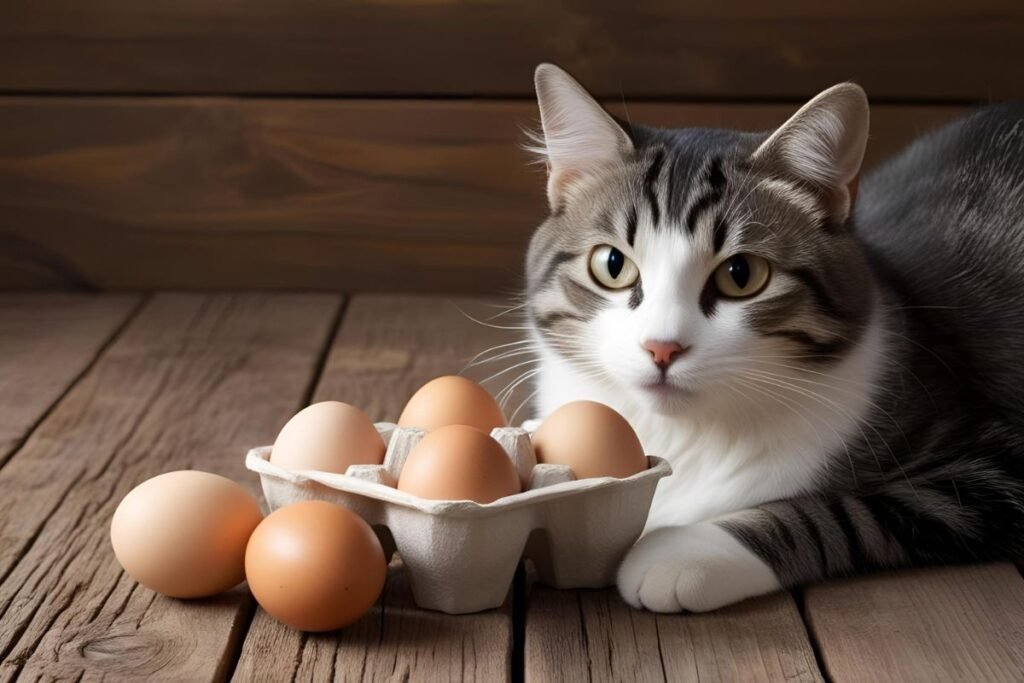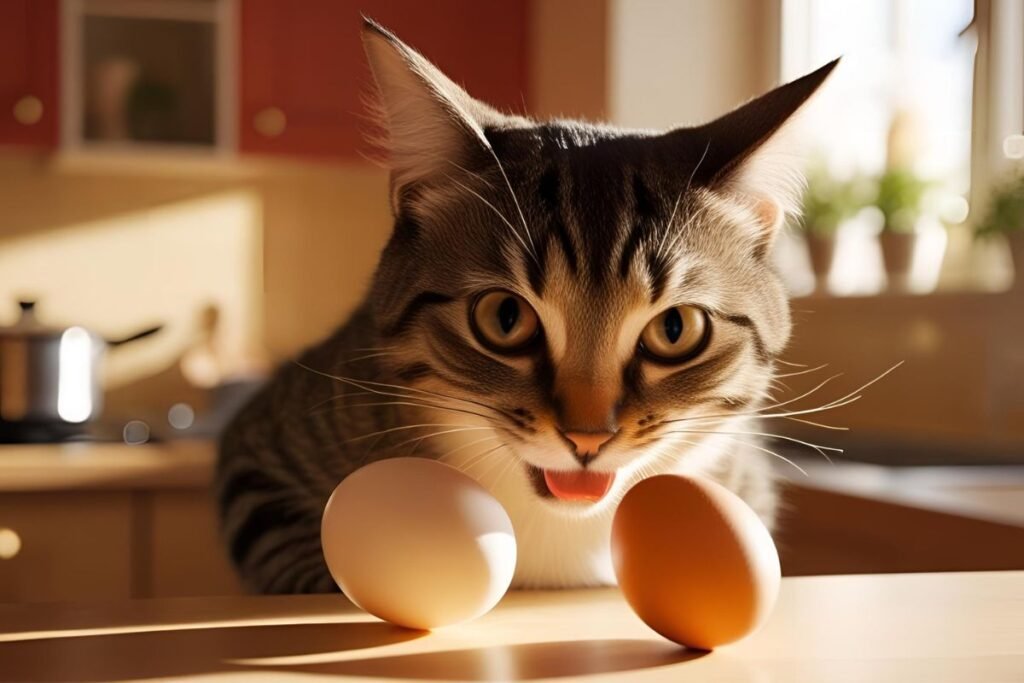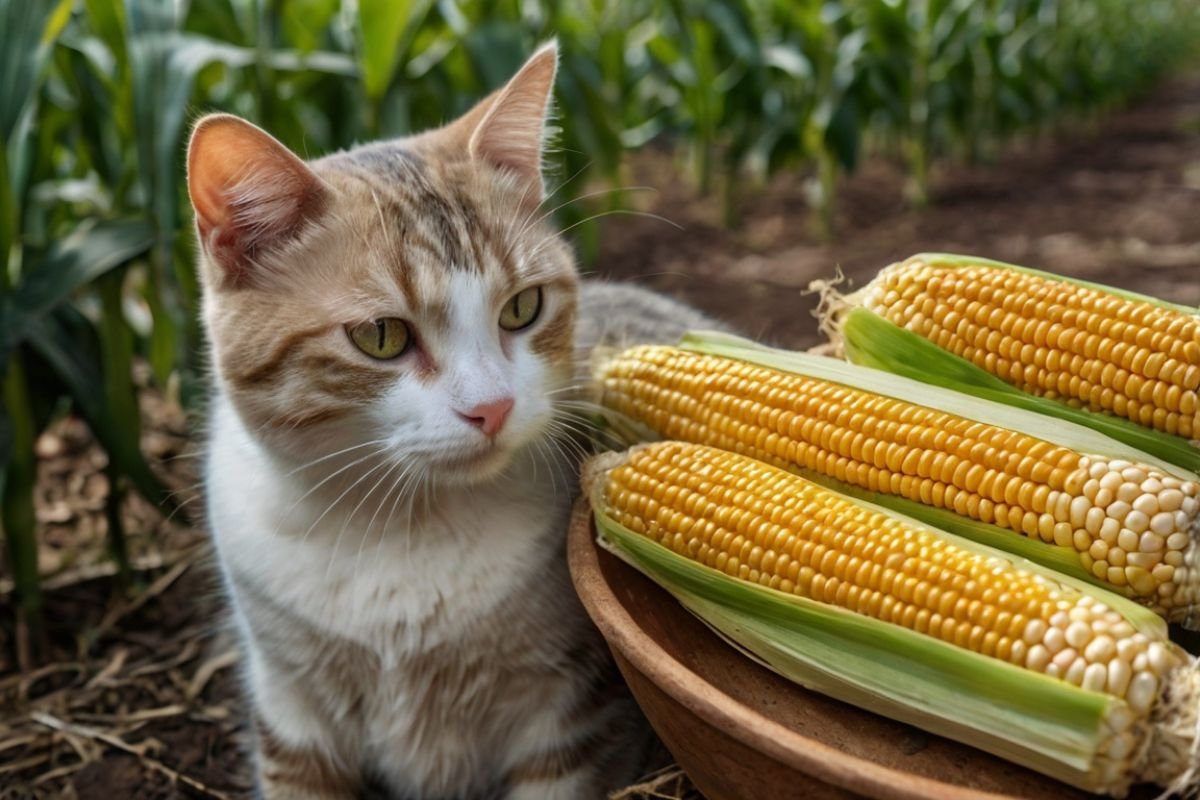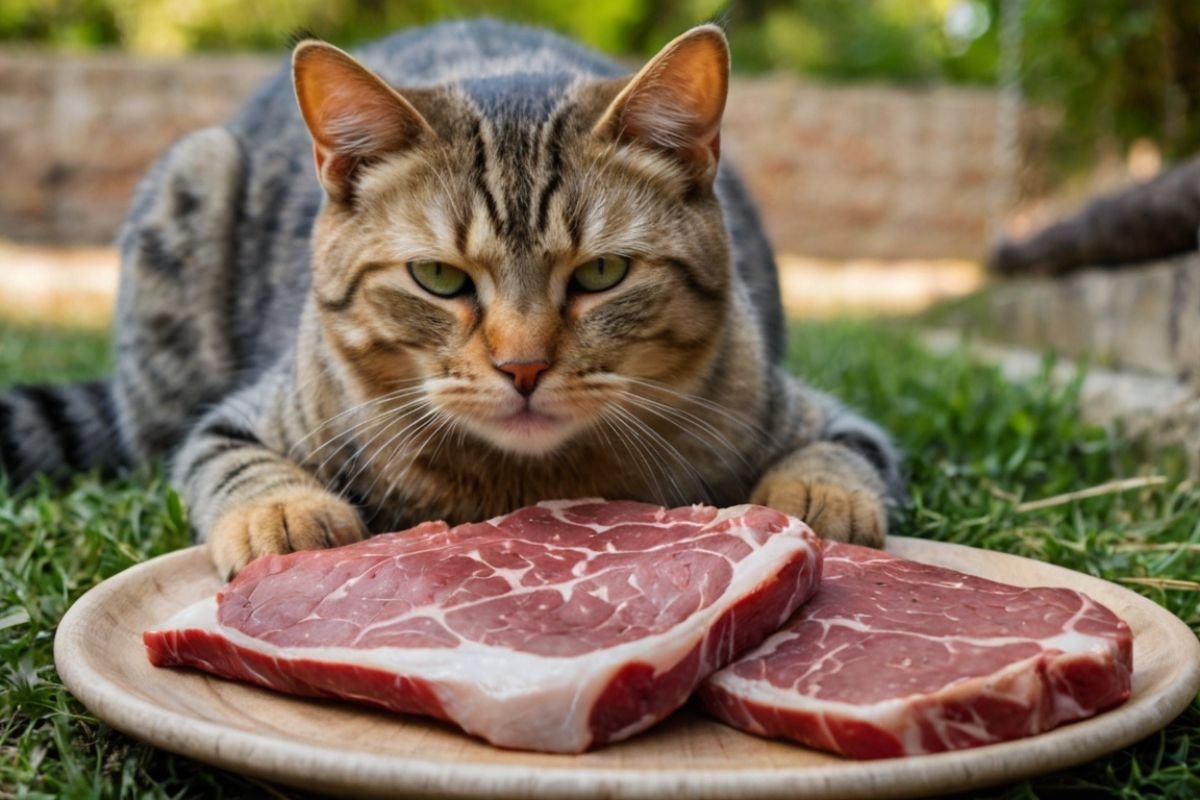Eggs sit in my fridge most days. As I crack one open for my breakfast, my orange tabby Rio watches with those big amber eyes. He’s two years old and always curious about what I eat. His tail twitches with interest as I cook. This makes me wonder – can cats eat eggs? Is it safe to share with him?

Table of Contents
Quick Answer
Yes, cats can eat eggs! Eggs are safe for cats when cooked properly. They offer good protein and nutrients. But they should be a treat, not a main food.
My Experience with Rio (My Cat)
Rio first showed interest in eggs when he was just a year old. I was making scrambled eggs one morning when he jumped on the counter (I know, bad cat parent moment). His nose twitched at the smell. Since then, I’ve done lots of research to make sure I feed him eggs safely.
Also read, Can Cats Eat Chocolate?
Are Eggs Good for Cats?
Eggs pack a lot of nutrition in a small package. Let’s look at why they can be good for your cat.
The Nutrition in Eggs
One medium egg has:
- High-quality protein
- Amino acids that cats need
- Vitamin A
- B vitamins
- Vitamin D
- Vitamin E
- Iron
- Zinc
- Selenium
Cats are meat eaters by nature. Their bodies need animal protein. Eggs have all nine essential amino acids cats need. These help build muscle, keep their coat shiny, and keep their immune system strong.
The fats in eggs help cats absorb vitamins. Vitamin A helps eye health. B vitamins aid energy and brain function. Vitamin D supports bone health, while vitamin E acts as an antioxidant.
Rio gets most of his nutrients from his cat food. But eggs make a healthy treat that adds some variety to his diet.
Are There Risks with Feeding Eggs to Cats?
While eggs can be good for cats, there are some risks to know.
Raw Eggs: A Bad Idea
Raw eggs can have bad bacteria like Salmonella or E. coli. These can make your cat sick with:
- Vomiting
- Diarrhea
- Fever
- Loss of appetite
- Lethargy
Raw egg whites contain avidin. This protein binds to biotin (vitamin B7) and stops cats from using it. Over time, this could lead to skin issues and coat problems.
I always cook eggs for Rio to kill any bacteria and break down the avidin.
Egg Allergies in Cats
Cats can be allergic to eggs, just like people. Signs of an egg allergy might include:
- Itchy skin
- Ear infections
- Hair loss
- Vomiting or diarrhea
- Sneezing or coughing
When I first gave Rio eggs, I watched him closely for any bad reactions. He was fine, but if your cat shows these signs, stop giving eggs and talk to your vet.
Too Many Eggs = Too Many Calories
Eggs have fat and calories. Too many can lead to weight gain. A fat cat faces health risks like:
- Diabetes
- Arthritis
- Heart problems
- Liver disease
- Shorter lifespan
I keep egg treats small and not too often to keep Rio at a healthy weight.
How to Safely Feed Eggs to Your Cat
Want to share eggs with your cat? Here’s how to do it safely.
Cook Eggs Fully
Always cook eggs before giving them to your cat. This kills harmful bacteria and breaks down avidin in egg whites.
Good ways to cook eggs for cats:
- Hard-boiled
- Scrambled (no milk, butter, or seasonings)
- Poached
I usually hard-boil eggs for Rio. It’s easy and I can store extras in the fridge.
Skip the Extras
Cats don’t need the stuff we add to eggs. Avoid:
- Salt
- Pepper
- Onions or garlic (toxic to cats!)
- Butter or oil
- Milk or cream
- Cheese
Plain eggs are best for cats. Their taste buds are different from ours, and they don’t need the extra flavors.
Start Small
When you first give eggs to your cat, start with a tiny bit – maybe half a teaspoon. Watch for any bad reactions over the next 24 hours.
Rio’s first egg taste was just a small bite of hard-boiled egg white. When he did well with that, I slowly gave him more over time.
How Much Egg Can a Cat Eat?
Eggs should be only a small part of your cat’s diet. A good rule is:
- Treats (including eggs) should be no more than 10% of daily calories
- For most cats, that means no more than 1-2 tablespoons of egg a few times a week
I give Rio about a tablespoon of egg twice a week. He’s a medium-sized cat at about 10 pounds.
Different Ways to Serve Eggs to Your Cat
Want to add some variety? Here are safe ways to serve eggs to your cat.
Hard-Boiled Eggs
This is my go-to method for Rio. Hard-boiled eggs are easy to make and store. I can control the portion size by cutting off small pieces.
How to prepare: Boil eggs for 9-12 minutes. Cool completely. Peel and cut into small cat-sized bites.
Scrambled Eggs (Plain)
Some cats love the soft texture of scrambled eggs.
How to prepare: Beat an egg in a bowl. Cook in a pan with no oil or butter. Don’t add salt, pepper, or other seasonings. Let cool before serving.
Poached Eggs
Poached eggs have a soft texture some cats enjoy.
How to prepare: Boil water. Crack an egg into the water and cook until the white is firm. Remove, drain, and cool before serving small pieces.
Egg as a Food Topper
One of Rio’s favorite treats is a bit of egg mixed into his regular food.
How to prepare: Chop hard-boiled egg into tiny pieces. Sprinkle a teaspoon over your cat’s regular food as a special treat.
Eggs vs. Commercial Cat Food
Eggs are good, but they can’t replace cat food. Here’s why:
Complete Nutrition
Commercial cat foods are made to give cats all the nutrients they need in the right amounts. They have:
- Taurine (cats must get this from food)
- Balanced vitamins and minerals
- The right amount of protein, fat, and other nutrients
Eggs lack some nutrients cats need, like taurine. A cat eating only eggs would get sick over time.
Dietary Needs of Cats
Cats are obligate carnivores. This means they must eat meat to survive. Their bodies are made to digest and use nutrients from animal tissues.
While eggs have animal protein, they don’t have all the nutrients found in meat. Cats need a diet based mainly on meat to stay healthy.
Rio eats a high-quality cat food as his main diet. Eggs are just an occasional treat to add variety.
The Benefits of Eggs for Different Cats
Eggs can be extra helpful for certain cats.
Senior Cats
Older cats may benefit from eggs because:
- Easy to chew for cats with dental issues
- High in protein to help maintain muscle mass
- Contains nutrients that support immune function
If Rio is lucky enough to reach his senior years, eggs may become more than just a treat.
Active Cats
Very active cats burn more calories and may benefit from the extra protein in eggs. If your cat runs around a lot or is very playful, an egg treat might help support their energy needs.
Rio is quite active. He races around the house like a mad thing most evenings. I notice he seems to have even more energy on days after an egg treat.
Underweight Cats
If your vet says your cat needs to gain weight, eggs can be a healthy way to add calories. The protein and fat content can help skinny cats bulk up in a healthy way.
Rio has always been a good weight, but I fostered a thin cat once who benefited from egg supplements to her diet.
Eggs and Cat Nutrition: What Vets Say
Veterinarians generally agree that eggs can be a healthy treat for cats. Dr. Smith, Rio’s vet, told me eggs are fine in small amounts.
The American Veterinary Medical Association notes that most healthy cats can have eggs as treats. They stress that eggs should be thoroughly cooked and given in moderation.
When I asked Rio’s vet about eggs, she said they’re one of the better “people food” options for cats. She advised keeping it to small amounts and always cooking them well.
Egg Myths Debunked
Let’s clear up some common myths about cats and eggs.
Myth: Egg Yolks Are Bad for Cats
Some people think egg yolks have too much cholesterol for cats. But cats process cholesterol differently than humans. Moderate amounts of egg yolk are fine for most cats.
Rio gets both the white and yolk in his egg treats. His bloodwork has always been normal at vet checks.
Myth: Cats Can Eat Raw Eggs Because Wild Cats Do
While wild cats might eat raw eggs they find in nests, our domestic cats face different risks. Wild cats have stronger stomach acids and different gut bacteria. Raw eggs pose unnecessary risks for house cats.
I wouldn’t give Rio raw eggs, even though his wild ancestors might have eaten them. Better safe than sorry!
Myth: Cats Need Eggs for Protein
While eggs are a good protein source, cats don’t need them. A high-quality cat food has all the protein your cat needs. Eggs are just a bonus treat.
Rio gets plenty of protein from his cat food. The eggs are just for fun and variety.
How to Tell if Your Cat Likes Eggs
Not all cats care for eggs. Here’s how to tell if your cat might enjoy them:
- Shows interest when you’re preparing eggs
- Comes running at the smell of cooking eggs
- Eagerly eats egg when offered
- Purrs or seems happy after eating eggs
Rio has a special “egg meow” that’s higher pitched than his normal one. He uses it when he smells eggs cooking. It’s his way of saying, “Don’t forget me!”
Introducing Eggs to Your Cat’s Diet
Want to try giving eggs to your cat? Here’s a step-by-step plan:
- Check with your vet first, especially if your cat has health issues
- Cook a small egg portion fully (hard-boiled is safest)
- Offer a tiny amount (1/2 teaspoon) the first time
- Watch for 24 hours for any bad reactions
- If all goes well, you can offer small amounts as occasional treats
The first time I gave Rio egg, he sniffed it carefully before taking a small bite. His eyes widened, and he quickly ate the rest! Not all cats will be fans right away.
Stories from Other Cat Parents
I’m not the only one who gives eggs to my cat. Here are some experiences from other cat owners:
My friend Sarah’s cat Milo loves scrambled eggs. She makes them as a Sunday treat. Milo sits by the stove waiting for his portion.
Another cat parent told me her three cats all respond differently to eggs. One loves them, one is “take it or leave it,” and one won’t touch eggs at all.
A senior cat rescue group I follow online uses eggs to help underweight rescue cats gain healthy weight. They mix small amounts into their food.
Signs That Eggs Might Not Agree With Your Cat
Watch for these signs that eggs might not be right for your cat:
- Vomiting after eating eggs
- Diarrhea
- Excessive gas
- Itching or skin issues
- Lack of interest in food
- Lethargy
If you see these signs, stop giving eggs and talk to your vet.
Rio has never had issues with eggs, but I still watch him after egg treats just to be safe.
Other Healthy Treats for Cats
If your cat doesn’t like eggs or can’t eat them, try these other healthy treats:
- Small bits of cooked chicken or turkey (no bones, skin, or seasoning)
- Tiny pieces of cooked fish like salmon or tuna
- Commercial cat treats (look for quality ingredients)
- Freeze-dried meat treats
- Small amounts of plain yogurt (if your cat isn’t lactose intolerant)
Rio enjoys all these treats, but eggs remain one of his favorites.
Frequently Asked Questions About Cats and Eggs

Here are answers to common questions about feeding eggs to cats:
Can kittens eat eggs?
Yes, kittens can eat small amounts of fully cooked eggs. But their main diet should be kitten food that meets their special growth needs.
How often can I give my cat eggs?
Most cats can have a small amount of egg (1-2 tablespoons) once or twice a week.
Can cats eat egg shells?
No, don’t feed eggshells to cats. They could cut their mouth or throat. They also don’t need the calcium from shells if they eat complete cat food.
What if my cat steals raw egg?
If your cat licks a small amount of raw egg, watch for signs of illness. Call your vet if your cat shows signs of stomach upset or eats a large amount of raw egg.
Can cats with kidney disease eat eggs?
Cats with kidney disease should follow their vet’s diet plan closely. Ask your vet before giving eggs, as these cats often need controlled protein intake.
Final Thoughts: Eggs as Part of a Balanced Cat Diet
Eggs can be a healthy, tasty treat for most cats when prepared properly. They offer protein, vitamins, and minerals that can complement your cat’s regular diet.
Remember these key points:
- Always cook eggs thoroughly
- Start with small amounts
- Eggs are treats, not meal replacements
- Watch for any signs of allergy or upset stomach
- Check with your vet if your cat has health issues
Rio continues to enjoy his egg treats twice a week. His coat is shiny, he’s at a healthy weight, and he has plenty of energy for play. While I can’t give eggs all the credit, they seem to be a positive addition to his diet.
Does your cat have a favorite treat? Maybe eggs could be next on their list of things to try!
What started as a simple question – “Can cats eat eggs?” – has led me to learn so much about feline nutrition. By researching and consulting with vets, I’ve found a safe way to share a common food with my furry friend.
Rio is sitting next to me as I write this, giving me that look that says, “Is it egg time yet?” For him, the answer to “Can cats eat eggs?” is a definite yes!

Shahriar Robin is the creator of WhatPetsCanEat.com, a passionate pet lover and dedicated cat dad to Rio, a curious two-year-old orange feline who inspired this website. With a love for animals and a knack for research, Shahriar shares trusted, easy-to-understand information to help fellow pet owners make safe, healthy food choices for their furry friends.


